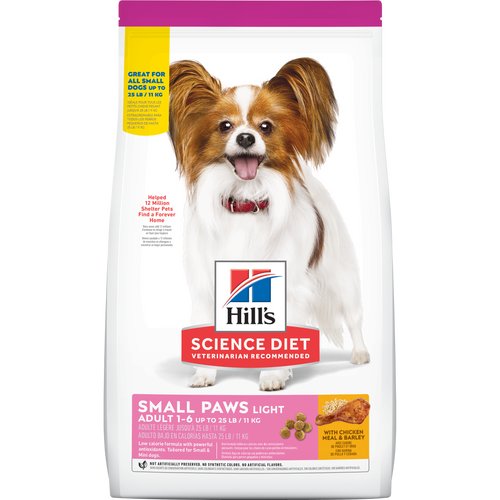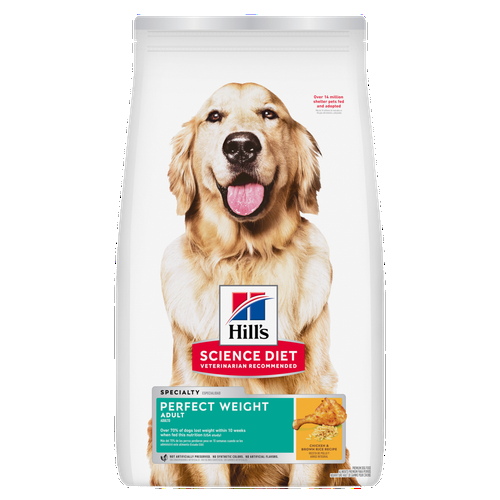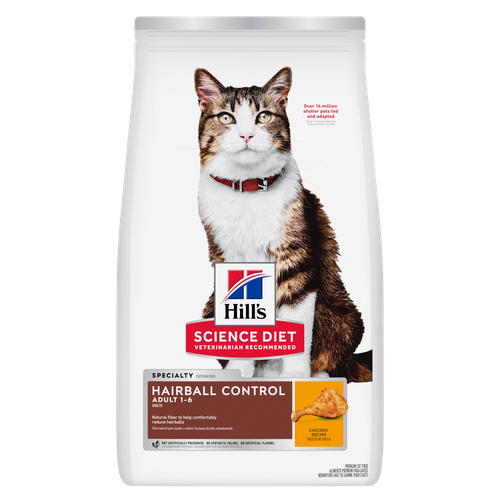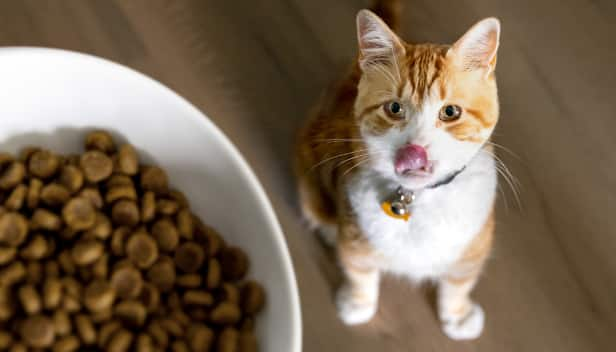
-
Find the right food for your petTake this quiz to see which food may be the best for your furry friend.Find the right food for your petTake this quiz to see which food may be the best for your furry friend.Featured products
 Adult Perfect Digestion Salmon, Whole Oats, and Brown Rice Recipe Dog Food
Adult Perfect Digestion Salmon, Whole Oats, and Brown Rice Recipe Dog FoodScience Diet's breakthrough nutrition supports ultimate digestive well-being & healthy microbiome
Shop Now Adult Light Small Paws with Chicken Meal & Barley Dog Food
Adult Light Small Paws with Chicken Meal & Barley Dog FoodLow calories for less active small & mini dogs
Shop Now Hill's Science Diet Adult Oral Care Chicken, Brown Rice & Barley Recipe Dog Food
Hill's Science Diet Adult Oral Care Chicken, Brown Rice & Barley Recipe Dog FoodClinically proven kibble technology to reduce plaque & tartar build-up
Shop NowFeatured products Adult Perfect Weight Chicken Recipe Dog Food
Adult Perfect Weight Chicken Recipe Dog FoodOver 70% of dogs lost weight within 10 weeks when fed this nutrition (USA Study)
Shop Now Adult Hairball Control Chicken Recipe Cat Food
Adult Hairball Control Chicken Recipe Cat FoodNatural fiber to help comfortably reduce hairballs
Shop Now Adult 7+ Chicken Recipe cat food
Adult 7+ Chicken Recipe cat foodSupports energy level and beautiful fur in mature cats
Shop Now -
Dog
- Dog Tips & Articles
-
Health Category
- Weight
- Food & Environmental Sensitivities
- Urinary
- Digestive
- Joint
- Kidney
-
Life Stage
- Puppy Nutrition
- Adult Nutrition
- Senior Nutrition
Cat- Cat Tips & Articles
-
Health Category
- Weight
- Skin & Food Sensitivities
- Urinary
- Digestive
- Kidney
-
Life Stage
- Kitten Nutrition
- Adult Nutrition
Featured articles Keeping Pets Calm During Thunderstorms
Keeping Pets Calm During ThunderstormsIs your dog scared of thunder? Does your kitty dart under the bed at the first rumble? Learn a few tips for keeping your pets calm during the storm.
Read More Moving With a Pet: A How-To Guide
Moving With a Pet: A How-To GuideDiscover helpful tips for moving with your pet including safety recommendations to keep in mind on moving day & pet behavior to watch for at your new home.
Read More How to Reduce Your Pet's Carbon Paw Print
How to Reduce Your Pet's Carbon Paw PrintHeaded outside? How you and your pets engage with nature can affect the environment, so here are some quick tips for reducing your pet's carbon paw print.
Read More -
Food allergies in cats
Food allergies in cats
Does your cat have signs of food allergies?
If a cat vomits frequently, has diarrhea, irritated skin, a poor coat condition or hair loss, then they may have food allergies. The most common symptoms are digestive upset or skin irritation. These signs can be long-term, recurring and should be noted to your vet.














What causes allergies in cats?
One of the most difficult things on a cat’s path to recovery is determining what is causing their allergies. Food allergies in cats are caused by a reaction to a particular ingredient, usually a protein. Food allergies may last a lifetime so the ingredient must be permanently removed from your cat’s diet.
What causes allergies in cats?
One of the most difficult things on a cat’s path to recovery is determining what is causing their allergies. Food allergies in cats are caused by a reaction to a particular ingredient, usually a protein. Food allergies may last a lifetime so the ingredient must be permanently removed from your cat’s diet.



Environmental allergies
A cat may react to certain substances in their environment — like grasses, pollen, mold or biting insects. Removing the offending allergen along with a multimodal approach can help reduce the adverse signs of environmental allergies in cats.



Food allergies
Cats may experience reactions to certain ingredients, and they are identified through food elimination trials conducted by your veterinarian. A food elimination trial is a process of finding and removing the food ingredient causing skin issues or digestive upsets. Luckily, food allergies are uncommon in cats.
Managing a cat’s allergies
Managing a cat’s allergies can be a challenging process, and your first step should be visiting your veterinarian. They will help you find the right combination of nutrition, medication, and/or topicals for your cat.


Trust
Living with a cat with food allergies can cause you both to be restless, but the road to recovery will require time, patience and trust in your vet. Remember — just like humans, every cat is unique, and the best solution will come from working with a professional to address your pet’s specific needs. Together, you’ll get on the right track to helping your best friend feel like their best self.


Nutrition
Therapeutic nutrition plays an important role in the long-term management of allergies in cats. The right nutrition can promote healthy skin from within and help alleviate your cat’s signs quickly and long-term. Even with treatment, some cats may have recurring signs that will require adjustments along the way, and your veterinarian will be a helpful resource in managing your cat’s allergies.


Medication
A vet may prescribe medication to help alleviate your cat’s signs of allergies. If you are wondering what you can give your cat for allergies, only give medication as recommended by your vet.


Topicals
Topicals can be used for managing allergies in cats. There are various deliveries for topicals like shampoos, lotions, sprays or ointments. Reach out to your veterinarian to ensure a specific topical is appropriate for your pet’s skin condition and life stage.


Understanding nutritional support for food allergies
You’ll want to ask your vet about a few things when it comes to the best cat food for food allergies. Ask about therapeutic cat food with a novel protein or hydrolyzed protein that is unlikely to cause a reaction.


Time to see a veterinarian?
If you notice behavior changes or sense something is off with your cat, it may be time to schedule a vet visit.
You also may want to ask your vet if therapeutic nutrition would be appropriate for your cat. Hill's Prescription Diet foods are developed by a team of Ph.D. nutritionists and veterinarians, and require a vet recommendation for purchase. Schedule an appointment so your vet can assess your pet's health and nutritional needs.
Related products

Clinical nutrition formulated to help cats lose weight and manage blood sugar

Nutrition clinically shown to help protect kidney function and maintain a healthy weight and muscle mass

Clinically tested nutrition formulated for multiple benefits: digestive health, weight management, blood sugar management and urinary health

Supports energy level and beautiful fur in indoor cats

